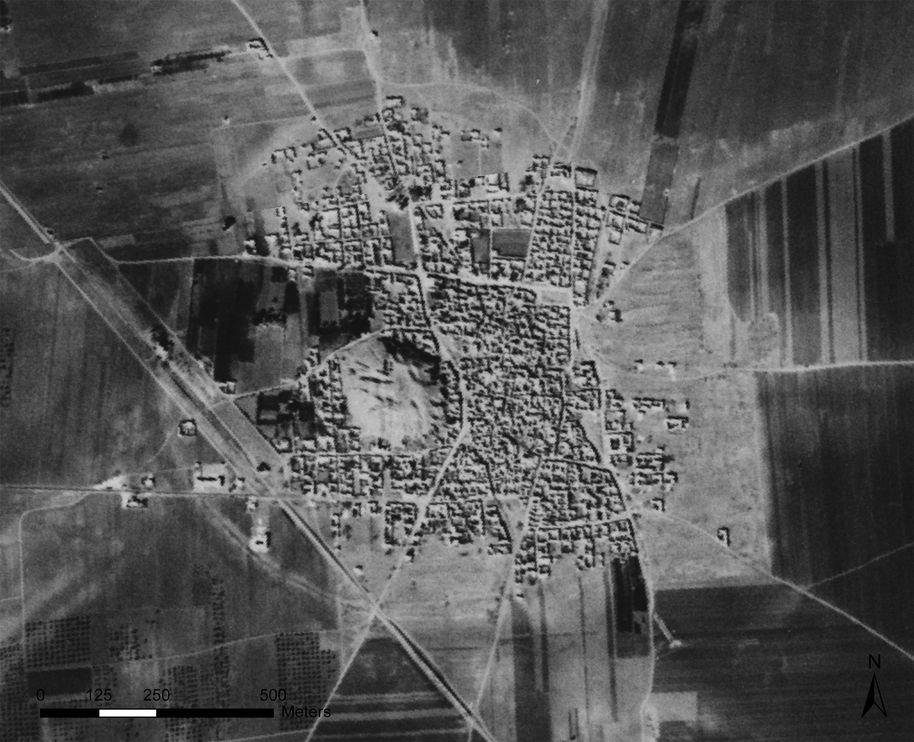Old spy satellite images get a new life revealing ancient cities
This 1961 satellite photo shows Tell Rifaat an ancient town in northwest Syria that is now completely surrounded by a modern town.
A massive project to map the ancient cities of the Middle East, often called the cradle of civilization, is looking back in time.
While cameras on modern commercial satellites reveal incredible details on the ground with the click of a mouse, those images are of the present. And that's where the powerful Corona satellites, Cold War-era American spy satellites, had an advantage. They've long disappeared, but not the photos they took.
With incredible resolution for their day, the old images taken by the satellites have helped researchers find 10,000 archaeological sites that have been erased from the map by human progress. National Geographic has examples of some of these photos — as well as the story about how researchers hope to turn this new form of intelligence into archaeology.
(Editor's note: The Global Scan can be delivered straight to your inbox every weekday. Just register and sign up today.)
Egypt puts 720 more men on death row — in a single day
A notorious Egyptian judge, who famously sentenced 529 people to death last year, was back with another mass order for Egyptian men to hang. The judge sentenced to death 683 men convicted of killing an Egyptian police officer. In addition, he affirmed the death sentences for 37 of the previous men he'd ordered put to death — though he commuted the remaining 492 men's sentences to 25 years in prison.
All told, the judge has ordered 1212 men to die, 720 of them still face execution. The Guardian has the story.
What if your mother-in-law controlled your access to birth control?
In Pakistan, children are a family affair. Sonia Narang of PRI's The World visited Pakistan and met a woman who's pregnant, not long after giving birth to a child. And she's not exactly thrilled about it. It turns out the woman would have liked to go on birth control but she was overruled by her mother-in-law.
In Pakistan, it's common for the parents of the husband to have final say on all sorts of matters involving childbirth and pregnancy. Issues like when a couple decides to have children, when they decide to stop having children and how much time between children are all often decided by the husband's mother. This is the latest installment in our special series The Ninth Month, an intimate look at pregnancy and childbirth around the world.
The world's most offensive sports tycoon is not Donald Sterling
The NBA has a Donald Sterling problem — but as troublesome as the comments attributed to him may be, if he truly said them, there's a team owner in Romania who is worse. Meet George "Gigi" Becali, one of Romania's richest men and a former shepherd-turned-real estate mogul. According to the Washington Post, he's "possibly the most offensive owner in world sports." Becali has a "penchant for homophobic, misogynist [and] racist rhetoric."
Among his more extreme comments were a comparison of Lady Gaga and Satan, an outright ban on Queen songs because of Qteh band's lead singer's sexuality, a refusal to employ gay soccer players and, reportedly, a decision to fire a coach for being "too Muslim."
You may have to say goodbye to the banana as we know it
The world banana crop is in serious danger — it could be completely wiped out by a crop fungus that's slowly spreading around the world. It recently made the jump from southeast Asia to Africa, but if it makes it to Latin America, the banana as we know it could disappear from supermarket shelves.
PRI's Living on Earth has pictures of what the fungus-infected bananas look like, as well as the serious consequences that could come from the its continued spread. So far, there's no way to stop the spread of the disease.
What we're seeing on social
Weather around the world
In Pakistan, temperatures are climbing so high that, according to Pakistan Today, demand for "caps, sunglasses and umbrella has gone rampant" — especially in the major cities of Islamabad and Rawalpindi. Tuesday's high is expected to approach 99 degrees Fahrenheit (37 Celsius.)
The story you just read is accessible and free to all because thousands of listeners and readers contribute to our nonprofit newsroom. We go deep to bring you the human-centered international reporting that you know you can trust. To do this work and to do it well, we rely on the support of our listeners. If you appreciated our coverage this year, if there was a story that made you pause or a song that moved you, would you consider making a gift to sustain our work through 2024 and beyond?
